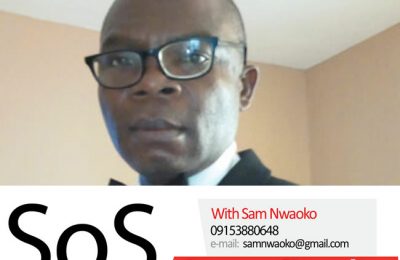
Mercy Okeke, popularly known as Madame Landlady, is a real estate expert and mentor based in Lagos. She is the founder and convener of the Anvil mentorship programme through which she teaches and mentors people in the real estate business. In this interview by Kingsley Alumona, she speaks about her work and other issues.
Your bio said you went from cleaning real estate offices to becoming a real estate expert and mentor. Tell us about this journey.

It all started at Alaba International Market. I needed a million naira capital to start a hair business. Knowing I might not find someone to invest such money in a new business, I thought to get a job — maybe I could work and save up the capital. I got a job as a cleaner. The pay was only N20,000 and didn’t make sense. How long would I save till I had one million naira?
But I took the job nevertheless. It was in a real estate company. A few days later, I got to know I could promote the company’s properties, sell them, and earn a commission. That was how my journey in real estate started.
You mentioned that it took you about two years to strike your first real estate deal. Tell us how you were able to land that first deal.
The real estate market is a unique one. Because of its capital intensity, closing deals demands some skill set and a good network of relationships. For two years, I went from the Alaba International market to the trade fair market, Balogun market, and even Oshodi, marketing to people, but not a single deal closed.
One day, I decided to start using my social media platforms to promote my real-estate business since the offline marketing wasn’t yielding results. And to my surprise, I got someone who showed interest in buying some plots in Ibeju-Lekki. We had inspections and he paid for two plots of land. That was my first-ever real estate sale in September 2019.
A few days ago, you stated that you had received many requests from real estate companies in the United States and Dubai to sell properties in those countries, but you turned the offers down. Why?
I strongly believe that destiny is location-sensitive. Also, I’m a firm believer that every entrepreneur must be driven by a vision and a set of core values that would guide every decision they make, and opportunities they accept.
The Nigerian real estate market is largely untapped. There are opportunities we have not explored in the industry. There are unique challenges we have not reached a solution yet in Nigeria. All these are money-making avenues if we provide the solutions.
Living and working in Nigeria, I have sold properties to clients across five continents of the world, and over 10 countries. I can proudly say I run a successful business here to a great extent.
It’s easy to run off abroad thinking that there lies the solution to all your problems, but if you lack a vision, strategy, and focus, your life and business will remain the same — the only difference is that you are in a different geographical location. The grass is only greener where you water it. If we water Nigeria, there are lots of opportunities to make money and grow wealth here. I am not ready for the overseas market yet.
There is confusion or controversy, especially in southwestern Nigeria, where real estate agents exploit people seeking land, property, and houses to buy or rent. They charge between 30-40 per cent commission on the property or rent of the house they are in charge of selling or renting. So, what is the commission, in terms of percentage on a property, acceptable by law?
I have never seen a commission charge of 30/40 percent on a property — whether bought or rented. The highest I have seen is 20 percent, and this is mostly for rental properties. The percentage commission on a property can vary depending on the location, and type of property — whether land or house, residential or commercial. The average commission on land sales is between 10-15 percent. While house sales are between 3-5 per cent. This commission serves as the real estate agent’s earnings for all the effort put into it — searching for the property, marketing or advertising it, endless consultations with multiple potential buyers, time spent on multiple inspections, and negotiating the best deal for the buyer.
The commission can’t be waived totally. It can only be reduced by a small percentage, depending on the negotiations and relationship between the agent and the buyer.
You were currently quoted to have said that “the greatest business is real estate.” Why would you say that?
I can’t entirely say the greatest business is real estate. As much as real estate is a factor of production and a solid basis for growing wealth, there are many more highly profitable industries you can build a great business.
For anyone hoping to go into the real estate business, I would say have conviction first. Have a vision of the solutions and impact you want to drive in the industry — and, in your development projects, put the interest and safety of people first before profit. For anyone looking to acquire properties, please ensure to do your due diligence, and work with a professional realtor. Ask questions and be clear on the owner of the property, chronology of ownership, and the status of the property before purchasing.
Recently, you posted on LinkedIn that the Nigerian real estate sector is largely untapped. What is your basis for the assertion?
My assertion that the Nigerian real estate sector is largely untapped is based on several key factors among which are the housing deficit versus rapid population growth. The demand for housing continues to surpass the current supply. This presents massive opportunities for investors in both residential and commercial real estate. Real estate developers are doing their best to develop housing units yearly, but statistics have shown that we’ll need at least 10 million houses by 2030 to finally bridge this housing gap.
Other key factors are limited mortgage opportunities, underutilised lands in emerging locations, lack of affordable decent housing, and sustainable developments. At this time, a lot of developers are doing their best to develop mass housing schemes and land banking options in developing locations. PropTech companies are emerging, providing easier access to property listings, property verifications online, and fractional property ownership. Some developers are integrating renewable energy, and smart home features for a more eco-friendly environment.
The real estate business is currently dominated by men, and most women do not like venturing into it. What would you say are the major challenges women in this business face and how can they manage the challenges?
Women in the real estate industry often encounter challenges like historical gender biases and cultural stereotypes. But lately, with more education and campaigns against gender biases, promotion of inclusion in the workplace and women empowerment initiatives, we now have a more inclusive environment that supports women in the space. To a large extent, the industry provides a healthy environment and support for women to acquire lands and become developers.
You are the founder and convener of the Anvil Mentorship Programme. Tell us about the programme.
The Anvil mentorship programme is a 13-week mentorship programme for realtors who want to go from being a regular realtor to a real-market leader. We boast a robust curriculum that covers various economics in the life of a realtor for a fulfilling career. We also infused a dedicated accountability to ensure that the mentees put to work what they learn.
Throughout the mentorship programme, we would have classes on vision development for market leaders, brand and communications, sales and marketing; closing desks and following up, content creation and social media marketing, relationship building and client services, just to mention a few.
In the course of your work in the real estate business, you go by the name ‘Madame Landlady’ and advocate sustainable development goals (SDGs) 9, 11, and 15. Tell us how and why you came up with the nickname ‘Madame Landlady’ and why you chose to advocate these SDGs.
The name Madame Landlady came to be because I wanted a name that made me easily recognisable — you can hear the name and easily decipher what I do.
I advocate sustainable cities and development because beyond selling property, it is important to prioritise the health and safety of the people who live in our development projects. I believe that real estate development must go beyond constructing buildings. It should also build a better future for people, communities and the environment because the value of real estate is closely tied to the quality of the surrounding environment.
It also reflects my broader vision for the real estate industry.
Where do you see the Nigerian real estate industry in ten years? And where do you see yourself in five years?
Nigeria real estate is so promising, with lots of untapped potential, like I said. Over the next decade, we would see more mature and significant growth, with more investments in infrastructure and public-private partnerships. I look forward to a stable market with regulated pricing. We would also see a more improved transportation network. For our development projects, I hope to see projects that are sustainability-driven.
As Madame Landlady, my career is closely intertwined with the evolution of the industry, I aim to be at the forefront of sustainable real estate initiatives that prioritise shaping environments, providing decent housing, and preserving our planet.
In five years, I also plan to have built a robust network of industry leaders through my mentorship programme.
How do you relax from the stress associated with your work? And if you were to be given an all-expense paid trip to any country for pleasure, which country would you prefer and why?
After work, I want to sleep. And, an all-expense paid trip right now would have me in Singapore.
What is your advice for women who are aspiring to venture into real estate and be successful like you?
Be convinced. Get competence and confidence. Build character. Stay consistent. These five Cs are the foundation for a successful career and personal life.
READ ALSO: Real estate part of every human endeavour — Stephen Akintayo








